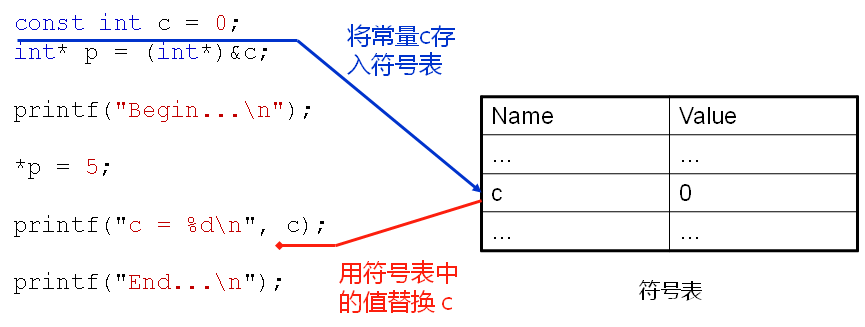1. C语言中的const变量(const修饰变量)
(1)const修饰的变量是只读的,使得变量具有只读属性,但本质还是变量
(2)const定义的并不是真正的常量,它只是告诉编译器该变量不能出现在赋值符号的左边。
(3)const修饰的局部变量在栈上分配空间,全局变量在只读存储区分配空间
(4)const只在编译期有用,在运行期无用
【编程实验】C/C++中的const 3-1.cpp
#include <stdio.h>
int main()
{
const int c = 0; //C语言中会为变量c分配内存
int* p = (int*)&c; //C++中遇到&才为c分配内存
printf("Begin...
");
*p = 5; //内存中的值己被改为5.
printf("c = %d
", c);//C语言会输出内存中的5.
//C++中会从符号表(而不是内存)中取值,所以为0
printf("End...
");
return 0;
}
运行结果:

2. C++中的const变量(const修饰变量)
(1)C++在C语言的基础上对const进行了优先处理,当碰见const声明时在符号表中放入常量。
(2)编译过程中若发现使用常量,则直接以符号表中的值替换。

(3)C++编译过程中若发现对const常量使用了extern或&操作符,则会给对应的常量分配存储空间。
(4)注意:C++编译器虽然可能为const常量分配空间,但不会使用其存储空间中的值。
3. 对比C/C++中的const
|
|
C语言 |
C++ |
|
本质 |
只读变量 |
常量 |
|
分配内存 |
会分配 |
可能分配存储空间
|
4. C++中的const与宏的区别(const常量类似于宏定义)
|
C++中的const |
宏 |
|
|
定义 |
const int c = 5; |
#define c 5 |
|
处理方式 |
由编译器处理,编译器会进行类型检查和作用域检查 |
由预处理器处理,只是简单的文本替换 |
【编程实验】const常量与宏定义 3-2.cpp
#include <stdio.h> void f() { //宏由预编译处理,其后面的宏起作用 #define a 3 const int b = 4;//作用域仅限于f函数 } void g() { printf("a = %d ", a); //合法,只要是宏定义之后都可以使用 //printf("b = %d ", b); //非法b的作用域仅限于f函数 } int main() { const int A = 1; const int B = 2; int array[A + B] = {0};//C++中合法,因为它认为A、B都是常量。 //而C语言的const本质还是变量,数组大小只能是常量 int i = 0; for(i=0;i<(A + B); i++) { printf("array[%d] = %d ", i, array[i]); } f(); g(); return 0; }
运行结果:

5. 小结
(1)与C语言不同,C++中的const不是只读变量
(2)C++中的const是一个真正意义上的常量
(3)C++编译器可能会为const常量分配空间
(4)C++完全兼容C语言中的const常量的语法特性
补充:
6.const指针(const修饰指针)
(1)几种情况
①const int* p; //p可变,p指向的内容不可变
②int const* p; //p可变,p指向的内容不可变
③int* const p; //p不可变,p指向的内容可变
④const int* const p; //p不可变,p指向的内容不可变
(2)口诀:左数右指
①当const出现在*号的左边时,指针指向的数据为常量
②当const出现在*号的右边时,指针本身为常量
【实例分析】常量与指针
#include <stdio.h> int main() { int i = 0; const int* p1 = &i; int const* p2 = &i; int* const p3 = &i; const int* const p4 = &i; *p1 = 1; // compile error p1 = NULL; // ok *p2 = 2; // compile error p2 = NULL; // ok *p3 = 3; // ok p3 = NULL; // compile error *p4 = 4; // compile error p4 = NULL; // compile error return 0; }
7. const对象(const修饰对象)
(1)const关键字能够修饰对象,使之能为只读对象,即成员变量不允许被改变。
(2)只读对象是编译阶段的概念,在运行时无效。
8. const成员函数
(1)const成员函数中不能直接改写成员变量的值。
(2)const对象只能调用const成员函数。如拷贝构造函数里只能调用const成员函数
(3)const成员函数只能调用const成员函数
(4)const成员函数的定义:
Type ClassName::func(Type p) const{};//声明与定义都必须带const关键字
【编程实验】类的const函数初探
#include <stdio.h>
class Test
{
private:
int mi;
public:
Test(int i);
Test(const Test& t);//t是const对象(的引用),函数内只能调用const成员函数
int getMI() const; //const成员函数
void print() //非const成员函数
{
printf("mi = %d
", mi);
}
void show() const
{
//print(); //错误,const成员函数不能调用非const的成员函数
printf("mi = %d
", mi);
}
};
Test::Test(int i)
{
mi = i;
}
Test::Test(const Test& t)
{
}
int Test::getMI() const
{
//mi = 2; //const成员函数不能改变成员变量的值!
return mi;
}
int main()
{
const Test t(1); //const对象
t.getMI(); //正确,const对象只能调用const成员函数
t.show(); //正确,const对象只能调用const成员函数
//t.print(); //错误,const对象不能调用非const成员函数
return 0;
}
9. const函数重载
https://blog.csdn.net/qq_15041569/article/details/94169718